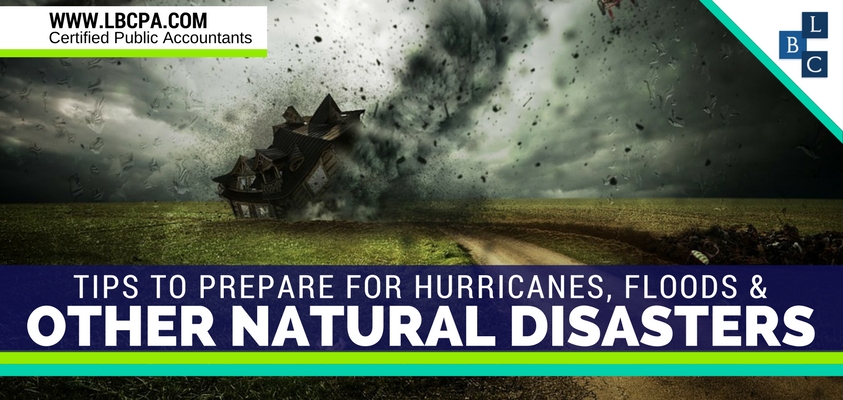LBCPA News 
Click here to go back
Tips to Taxpayers Preparing for Hurricanes, Floods and Other Natural Disasters

With Hurricane Preparedness Week, May 7 to 13, now in progress and the start of the Atlantic hurricane season looming on June 1, the Internal Revenue Service today offered advice to taxpayers who may be affected by these types of storms, as well as other natural disasters. The IRS also wants taxpayers to know that the agency is here to help, including offering a special toll-free hotline to people in federally declared disaster areas, staffed with IRS specialists trained to handle disaster-related issues.
Don’t Forget to Update Emergency Plans
Because a disaster can strike any time, be sure to review emergency plans annually. Personal and business situations change over time, as do preparedness needs. When employers hire new employees or when a company or organization changes functions, they should update plans accordingly and inform employees of the changes. Make plans ahead of time and be sure to practice them.
Create Electronic Copies of Key Documents
Taxpayers can help themselves by keeping a duplicate set of key documents including bank statements, tax returns, identifications and insurance policies in a safe place such as a waterproof container and away from the original set.
Doing so is easier now that many financial institutions provide statements and documents electronically, and financial information is available on the Internet. Even if the original documents are provided only on paper, these can be scanned into an electronic format. This way, taxpayers can download them to a storage device such as an external hard drive or USB flash drive, or burn them to a CD or DVD.
Document Valuables
It’s a good idea to photograph or videotape the contents of any home, especially items of higher value. Documenting these items ahead of time will make it easier to claim any available insurance and tax benefits after the disaster strikes. The IRS has a disaster loss workbook, Publication 584, which can help taxpayers compile a room-by-room list of belongings.
Photographs can help anyone prove the fair market value of items for insurance and casualty loss claims. Ideally, photos should be stored with a friend or family member who lives outside the area.
Check on Fiduciary Bonds
Employers who use payroll service providers should ask the provider if it has a fiduciary bond in place. The bond could protect the employer in the event of default by the payroll service provider.
IRS Ready to Help
In the case of a federally declared disaster, an affected taxpayer can call 866-562-5227 to speak with an IRS specialist trained to handle disaster-related issues.
Back copies of previously filed tax returns and all attachments, including Forms W-2, can be requested by filing Form 4506, Request for Copy of Tax Return. Alternatively, transcripts showing most line items on these returns can be ordered through the Get Transcript link on IRS.gov, by calling 1-800-908-9946 or by using Form 4506T-EZ, Short Form Request for Individual Tax Return Transcript or Form 4506-T, Request for Transcript of Tax Return.
Find other hurricane preparedness tips and more information about Hurricane Preparedness Week on the National Weather Service web site.
If you have any questions regarding accounting, domestic taxation, international taxation, IRS representation, U.S. tax implications of Real Estate transactions or financial statements, please give us a call at 305-274-5811.
Source: IRS






